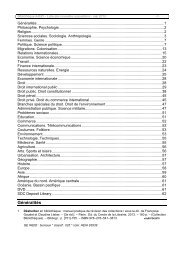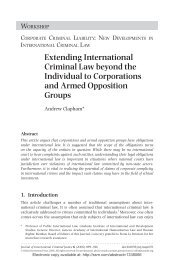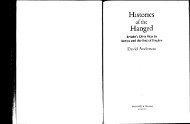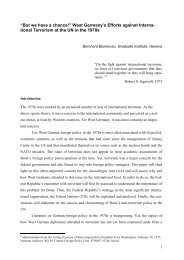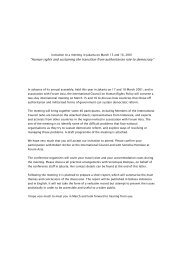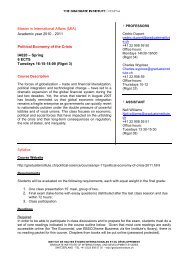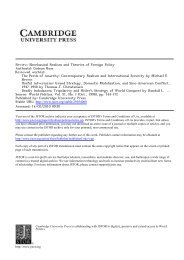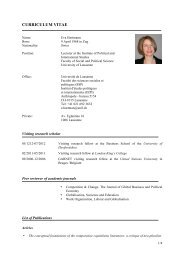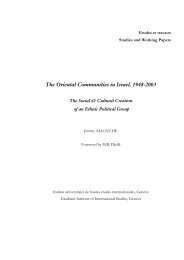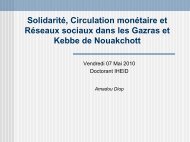- Page 1 and 2:
Global Dawn T h e C u lt u r a l F
- Page 4 and 5:
Global Dawn the cultural foundation
- Page 6:
To Marina and Francesca
- Page 10:
Ac know ledg ments I would like to
- Page 14 and 15:
Introduction Culture and Causality
- Page 16 and 17:
Introduction 3 ful and best- known
- Page 18 and 19:
Introduction 5 ideas and the polici
- Page 20 and 21:
Introduction 7 with one another) to
- Page 22 and 23:
Introduction 9 The liberal internat
- Page 24 and 25:
Introduction 11 found unity between
- Page 26 and 27:
Introduction 13 the equivalent of t
- Page 28 and 29:
1 A Global Civilization As a chapte
- Page 30 and 31:
A Global Civilization 17 these maga
- Page 32 and 33:
A Global Civilization 19 could be h
- Page 34 and 35:
A Global Civilization 21 Virginia s
- Page 36 and 37:
A Global Civilization 23 En glish a
- Page 38 and 39:
A Global Civilization 25 of scienti
- Page 40 and 41:
A Global Civilization 27 ful we bec
- Page 42 and 43:
A Global Civilization 29 type, glob
- Page 44 and 45:
A Global Civilization 31 as one. Th
- Page 46 and 47:
A Global Civilization 33 It seemed
- Page 48 and 49:
A Global Civilization 35 diminishin
- Page 50 and 51:
A Global Civilization 37 the 1870s,
- Page 52 and 53:
A Global Civilization 39 one’s tr
- Page 54 and 55:
A Global Civilization 41 vastly mor
- Page 56 and 57:
A Global Civilization 43 ample, sco
- Page 58 and 59:
A Global Civilization 45 mechanical
- Page 60 and 61:
2 Creating an International Identit
- Page 62 and 63:
Creating an International Identity
- Page 64 and 65:
Creating an International Identity
- Page 66 and 67:
Creating an International Identity
- Page 68 and 69:
Creating an International Identity
- Page 70 and 71:
Creating an International Identity
- Page 72 and 73:
Creating an International Identity
- Page 74 and 75:
Creating an International Identity
- Page 76 and 77:
Creating an International Identity
- Page 78 and 79:
Creating an International Identity
- Page 80 and 81:
Creating an International Identity
- Page 82 and 83:
Creating an International Identity
- Page 84 and 85:
Creating an International Identity
- Page 86 and 87:
Creating an International Identity
- Page 88 and 89: Creating an International Identity
- Page 90 and 91: Creating an International Identity
- Page 92 and 93: 3 Europe I The Mirage of Republican
- Page 94 and 95: Europe I 81 “modern civilization
- Page 96 and 97: Europe I 83 Americans developed a c
- Page 98 and 99: Europe I 85 Percy Roberts, agreed t
- Page 100 and 101: Europe I 87 would take place slowly
- Page 102 and 103: Europe I 89 high point of optimism
- Page 104 and 105: Europe I 91 The resolution of the A
- Page 106 and 107: Europe I 93 Thus, even when mea sur
- Page 108 and 109: Europe I 95 called him— the perfe
- Page 110 and 111: Europe I 97 the world on fire he ki
- Page 112 and 113: Europe I 99 they were too racy for
- Page 114 and 115: Europe I 101 Especially galling, in
- Page 116 and 117: Europe I 103 republicans,” incapa
- Page 118 and 119: Europe I 105 talk of revenge than i
- Page 120 and 121: Europe I 107 The Paris exposition o
- Page 122 and 123: Europe II 109 Between 1871 and 1890
- Page 124 and 125: Europe II 111 was far more than a m
- Page 126 and 127: Europe II 113 the police.” Howeve
- Page 128 and 129: Europe II 115 departure from the sc
- Page 130 and 131: Europe II 117 well become “a comm
- Page 132 and 133: Europe II 119 from Mr. Mackenzie Wa
- Page 134 and 135: Europe II 121 Rus sian masses only
- Page 136 and 137: Europe II 123 change possible seeme
- Page 140 and 141: Europe II 127 Embarrassed by this o
- Page 142 and 143: Europe II 129 were permanently or e
- Page 144 and 145: Europe II 131 declaration of infall
- Page 146 and 147: Europe II 133 mason fills the air w
- Page 148 and 149: Europe II 135 asm of the 1820s. Now
- Page 150 and 151: 5 The One and the Many Race, Cultur
- Page 152 and 153: The One and the Many 139 “Are we
- Page 154 and 155: The One and the Many 141 the market
- Page 156 and 157: The One and the Many 143 gist G. Fr
- Page 158 and 159: The One and the Many 145 vious diff
- Page 160 and 161: The One and the Many 147 social sci
- Page 162 and 163: The One and the Many 149 the same p
- Page 164 and 165: The One and the Many 151 Other disc
- Page 166 and 167: The One and the Many 153 Numerous o
- Page 168 and 169: The One and the Many 155 As an exam
- Page 170 and 171: The One and the Many 157 from mixin
- Page 172 and 173: The One and the Many 159 This pro-
- Page 174 and 175: The One and the Many 161 Descent of
- Page 176 and 177: The One and the Many 163 few years
- Page 178 and 179: The One and the Many 165 slaughter
- Page 180 and 181: 6 The Promise of Local Equality Ass
- Page 182 and 183: The Promise of Local Equality 169 c
- Page 184 and 185: The Promise of Local Equality 171 E
- Page 186 and 187: The Promise of Local Equality 173 r
- Page 188 and 189:
The Promise of Local Equality 175 E
- Page 190 and 191:
The Promise of Local Equality 177 B
- Page 192 and 193:
The Promise of Local Equality 179 c
- Page 194 and 195:
The Promise of Local Equality 181 f
- Page 196 and 197:
The Promise of Local Equality 183 U
- Page 198 and 199:
The Promise of Local Equality 185 t
- Page 200 and 201:
The Promise of Local Equality 187 C
- Page 202 and 203:
The Promise of Local Equality 189 t
- Page 204 and 205:
The Promise of Local Equality 191 F
- Page 206 and 207:
The Promise of Local Equality 193 w
- Page 208 and 209:
The Promise of Local Equality 195 r
- Page 210 and 211:
The Promise of Local Equality 197 a
- Page 212 and 213:
7 Beyond Orientalism Explaining Oth
- Page 214 and 215:
Beyond Orientalism 201 But for ever
- Page 216 and 217:
Beyond Orientalism 203 historical
- Page 218 and 219:
Beyond Orientalism 205 Alexandria i
- Page 220 and 221:
Beyond Orientalism 207 of mankind.
- Page 222 and 223:
Beyond Orientalism 209 classical Gr
- Page 224 and 225:
Beyond Orientalism 211 crumbling Gr
- Page 226 and 227:
Beyond Orientalism 213 the 1880s we
- Page 228 and 229:
Beyond Orientalism 215 country in t
- Page 230 and 231:
Beyond Orientalism 217 crisscrossed
- Page 232 and 233:
Beyond Orientalism 219 powerful sen
- Page 234 and 235:
Beyond Orientalism 221 Among the re
- Page 236 and 237:
Beyond Orientalism 223 a race that
- Page 238 and 239:
Beyond Orientalism 225 the main res
- Page 240 and 241:
Beyond Orientalism 227 a universal
- Page 242 and 243:
Beyond Orientalism 229 universalism
- Page 244 and 245:
Beyond Orientalism 231 more intimat
- Page 246 and 247:
Empire and Civilization 233 replace
- Page 248 and 249:
Empire and Civilization 235 velopme
- Page 250 and 251:
Empire and Civilization 237 critici
- Page 252 and 253:
Empire and Civilization 239 But...
- Page 254 and 255:
Empire and Civilization 241 to the
- Page 256 and 257:
Empire and Civilization 243 “them
- Page 258 and 259:
Empire and Civilization 245 Albert
- Page 260 and 261:
Empire and Civilization 247 corrupt
- Page 262 and 263:
Empire and Civilization 249 Boston
- Page 264 and 265:
Empire and Civilization 251 dered R
- Page 266 and 267:
Empire and Civilization 253 There w
- Page 268 and 269:
Empire and Civilization 255 In both
- Page 270 and 271:
Empire and Civilization 257 develop
- Page 272 and 273:
Empire and Civilization 259 Britain
- Page 274 and 275:
Empire and Civilization 261 true an
- Page 276 and 277:
9 International Politics Americans
- Page 278 and 279:
International Politics 265 “trans
- Page 280 and 281:
International Politics 267 be succe
- Page 282 and 283:
International Politics 269 reviewin
- Page 284 and 285:
International Politics 271 impossib
- Page 286 and 287:
International Politics 273 forgone
- Page 288 and 289:
International Politics 275 Rus sia,
- Page 290 and 291:
International Politics 277 while ot
- Page 292 and 293:
International Politics 279 Afghan W
- Page 294 and 295:
International Politics 281 En glish
- Page 296 and 297:
International Politics 283 problem
- Page 298 and 299:
International Politics 285 powers?
- Page 300 and 301:
International Politics 287 was wary
- Page 302 and 303:
International Politics 289 suffered
- Page 304 and 305:
International Politics 291 to see a
- Page 306 and 307:
10 The Future of International Rela
- Page 308 and 309:
The Future of International Relatio
- Page 310 and 311:
The Future of International Relatio
- Page 312 and 313:
The Future of International Relatio
- Page 314 and 315:
The Future of International Relatio
- Page 316 and 317:
The Future of International Relatio
- Page 318 and 319:
The Future of International Relatio
- Page 320 and 321:
The Future of International Relatio
- Page 322 and 323:
The Future of International Relatio
- Page 324 and 325:
The Future of International Relatio
- Page 326 and 327:
The Future of International Relatio
- Page 328 and 329:
The Future of International Relatio
- Page 330 and 331:
The Future of International Relatio
- Page 332 and 333:
The Future of International Relatio
- Page 334 and 335:
The Future of International Relatio
- Page 336 and 337:
The Future of International Relatio
- Page 338 and 339:
Conclusion 325 however, the legacy
- Page 340 and 341:
Conclusion 327 untimely demise, sti
- Page 342 and 343:
Conclusion 329 genic helix to the d
- Page 344 and 345:
Conclusion 331 computer operating s
- Page 346 and 347:
Conclusion 333 eventually built in
- Page 348:
Conclusion 335 may not be reconcila
- Page 351 and 352:
338 Notes to Pages 3-6 6. Leslie Bu
- Page 353 and 354:
340 Notes to Pages 17-19 (Charlotte
- Page 355 and 356:
342 Notes to Pages 23-28 Bailey, Im
- Page 357 and 358:
344 Notes to Pages 33-37 32. “His
- Page 359 and 360:
346 Notes to Pages 41-44 Americans
- Page 361 and 362:
348 Notes to Pages 50-51 6. Henry H
- Page 363 and 364:
350 Notes to Pages 53-57 Appleton o
- Page 365 and 366:
352 Notes to Pages 61-65 27. David
- Page 367 and 368:
354 Notes to Pages 70-73 44. “Civ
- Page 369 and 370:
356 Notes to Pages 80-83 2. Henry C
- Page 371 and 372:
358 Notes to Pages 87-90 Europe,”
- Page 373 and 374:
360 Notes to Pages 95-99 33. “Tab
- Page 375 and 376:
362 Notes to Pages 103-106 (Februar
- Page 377 and 378:
364 Notes to Pages 110-113 Characte
- Page 379 and 380:
366 Notes to Pages 118-122 What Is
- Page 381 and 382:
368 Notes to Pages 129-132 Nation (
- Page 383 and 384:
370 Notes to Pages 138-139 Had it f
- Page 385 and 386:
372 Notes to Pages 142-143 of drawi
- Page 387 and 388:
374 Notes to Pages 145-147 and Doro
- Page 389 and 390:
376 Notes to Pages 150-153 137, 156
- Page 391 and 392:
378 Notes to Page 156 Eva Jablonka
- Page 393 and 394:
380 Notes to Pages 161-163 and Dege
- Page 395 and 396:
382 Notes to Pages 168-170 3. [W. G
- Page 397 and 398:
384 Notes to Pages 174-178 15. “I
- Page 399 and 400:
386 Notes to Pages 183-186 Celestia
- Page 401 and 402:
388 Notes to Pages 190-193 (October
- Page 403 and 404:
390 Notes to Pages 201-203 in Spain
- Page 405 and 406:
392 Notes to Pages 208-212 18. [Sam
- Page 407 and 408:
394 Notes to Pages 216-219 (1871),
- Page 409 and 410:
396 Notes to Pages 224-228 50. “S
- Page 411 and 412:
398 Notes to Pages 233-236 1883), 8
- Page 413 and 414:
400 Notes to Pages 241-244 438. Gen
- Page 415 and 416:
402 Notes to Pages 249-252 36. [Ogd
- Page 417 and 418:
404 Notes to Pages 258-263 5, 1883)
- Page 419 and 420:
406 Notes to Pages 269-273 14. “T
- Page 421 and 422:
408 Notes to Pages 277-281 (April 1
- Page 423 and 424:
410 Notes to Pages 286-291 50. [W.
- Page 425 and 426:
412 Notes to Pages 296-299 1871), 6
- Page 427 and 428:
414 Notes to Pages 304-307 Lodge,
- Page 429 and 430:
416 Notes to Pages 313-319 Effect o
- Page 431 and 432:
418 Notes to Pages 326-328 6. Tylor
- Page 433 and 434:
420 Note to Page 334 a Culture and
- Page 435 and 436:
422 Index Brace, Charles Loring, 22
- Page 437 and 438:
424 Index Geertz, Clifford, 328, 33
- Page 439 and 440:
426 Index Merrill, George B., 223 M
- Page 441:
428 Index Towle, George, 75, 76, 87



![Download [pdf] - The Graduate Institute, Geneva](https://img.yumpu.com/23370020/1/190x248/download-pdf-the-graduate-institute-geneva.jpg?quality=85)
